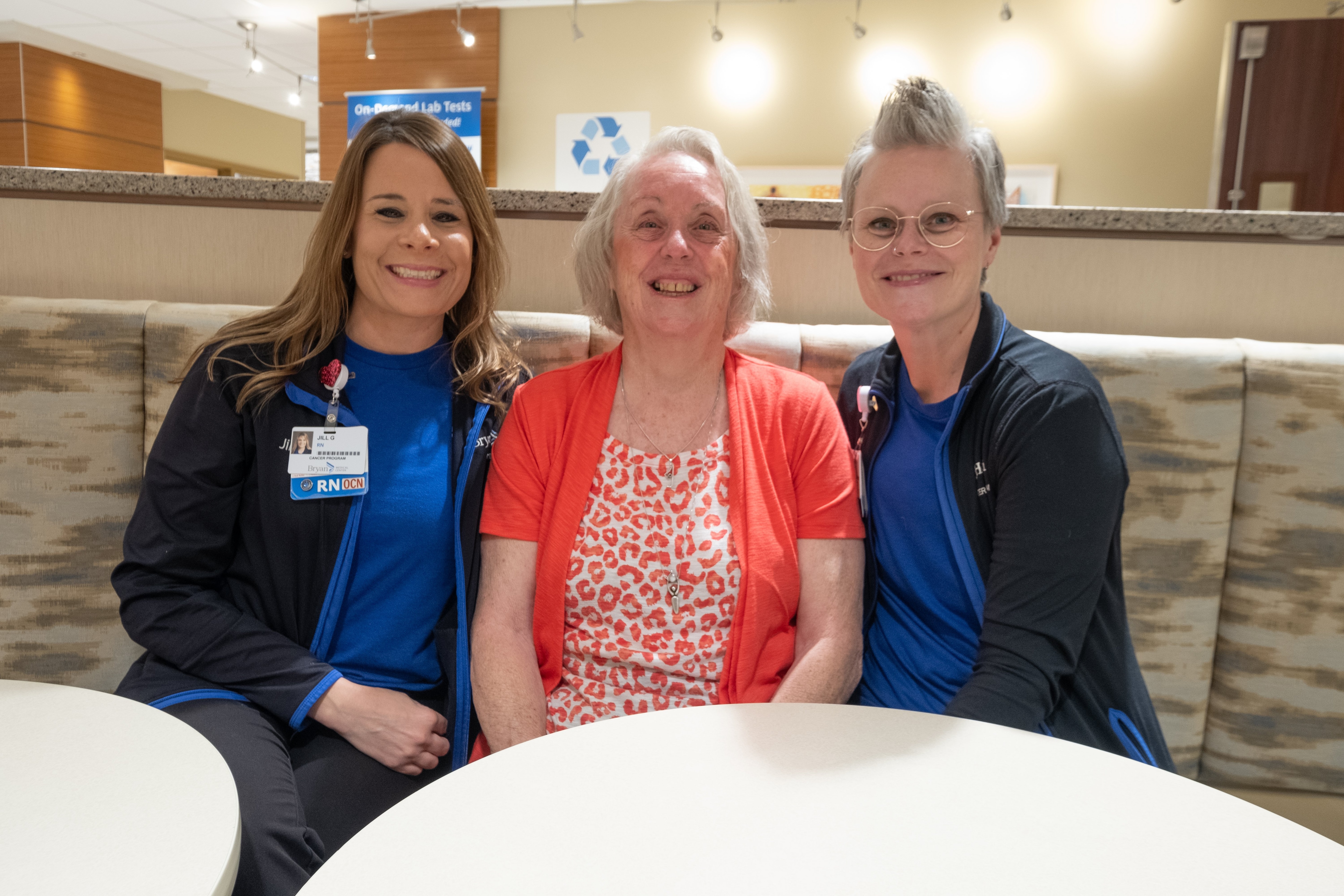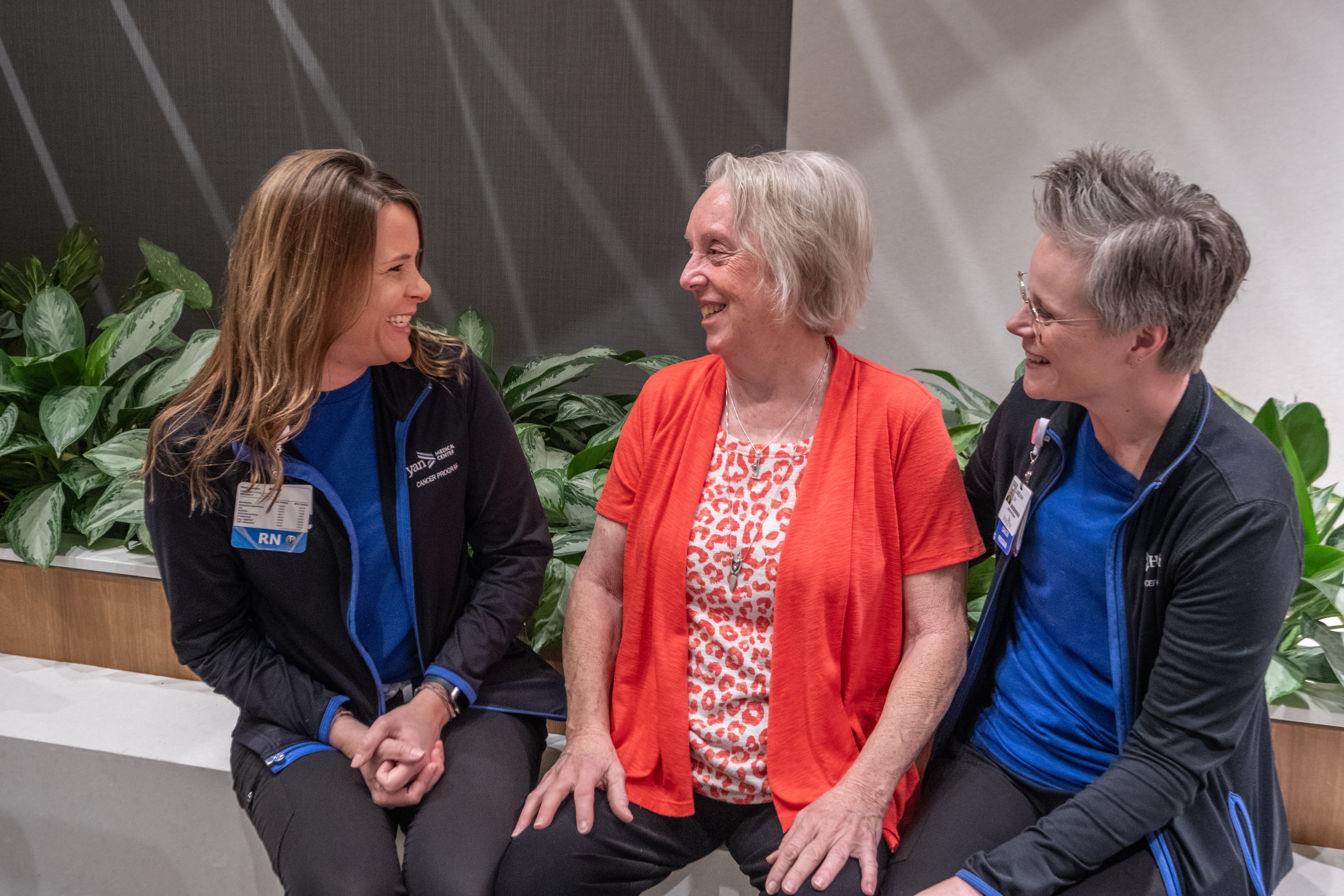Nurse Navigator, Social Worker Form Strong Bond with Colon Cancer Patient
Lynn has lived her whole life in fear of undergoing medical procedures. Stemming from childhood trauma, the idea of having no control over her body and environment terrifies her.
This fear is what made her colon cancer diagnosis, which would be scary for anybody, completely overwhelming.
“I couldn’t say anything,” she recalled after finding out she had cancer. “I was just like, ‘It can’t be. This isn’t real.’”
The panic she felt was debilitating. In her own words, she was ready to “let the cancer take me” instead of going through treatment.
The reasons she is still here today? Those would be her oncology nurse navigator, Jill Geschke, and oncology social worker, Joselyn Hayes.

The Care Process
Throughout Lynn’s journey, staff recognized her past trauma and its potential effect on her present treatment plan. During Lynn’s colonoscopy, the gastrointestinal lab staff saw how anxious she was. They contacted Jill, who reached out to Lynn and met her during a follow-up MRI a few weeks later.
Lynn told Jill about her past and how scared she was for the entire process. Joselyn soon joined Jill as part of Lynn’s support team.
Nurse navigators help with communication and coordination of care for a patient. They also answer any questions the patient may have. Social workers help connect patients to resources for mental health, finances and transportation. Together, they address barriers to care and serve as an advocate for the patient.
Jill said early contact with patients is a key part of her and Joselyn’s roles. The MRI revealed the cancer was blocking 75% of her colon, indicating the need for surgery. Jill and Joselyn worked closely to design a plan for Lynn’s procedure.
On the day of the surgery, they met Lynn in admissions and walked her to the surgery prep room. Jill and Joselyn stayed with Lynn until she was ready to go to the operating room. Dr. Clint Rathje was her surgeon that day. He had contacted the anesthesiologist, Dr. J Elizabeth Schoemaker, to inform her of Lynn’s needs.
Dr. Schoemaker used a mask with a mixture of anesthetic gas and oxygen to put her to sleep. This method was helpful because Lynn wasn’t conscious for the IV insertion. Lynn expressed her appreciation for Dr. Schoemaker adapting to her needs.
Jill and Joselyn came to visit her after Dr. Rathje successfully removed the cancer in her colon.
Patients' Guides
Jill and Joselyn said more people in health care are now aware of navigators and social workers and the benefits they provide. Medical staff know to pull in these resources if they detect a need in their patient.
“It’s so important as health care professionals that we are sensitive to patient needs," Joselyn said. "We don’t always know what people have gone through."
Jill said close relationships often develop between patients, navigators and social workers. With this closeness, they can better communicate patient needs to the rest of the care team.
Joselyn just finished her master’s degree in social work with a focus on patient trauma. She was the perfect fit for Lynn. She praised Lynn for being vulnerable with her and letting her in so she could help.
For Lynn, trust was the most difficult part.
“A lot of people don’t understand what trauma can do and how long it stays with you and affects every aspect of your life,” Lynn said. “So when you go in for care, it’s really important that people are trained for trauma. When Joselyn said she was trained in trauma, it was just like everything was aligning.”
Social workers and navigators will provide support to a patient as long as they are needed. For example, if a patient starts chemotherapy and is doing well, they may see the patient less. The patient is welcome to contact either person in the future, though. The navigator and social worker will also periodically check in.
Friendships Forged
Since the surgery, Jill and Joselyn take turns checking in with Lynn. Jill oversees the surveillance plan for Lynn, helping to watch for any cancer recurrence. Joselyn focuses more on mental and emotional support. The trio have become good friends and will often grab lunch together at the Bryan East Campus cafeteria to chat.
Lynn describes her support duo as the “muscle” of her treatment experience. They pushed her out of her comfort zone and gave her the strength to overcome her fears. Without them, Lynn swears she wouldn’t be here today.
“When you’re hit with the news, you have this surreal feeling where you don’t know what’s going to happen next,” Lynn said. “You don’t know if you’re going to die or how big it is. You don’t know what’s going to happen at all.”
Lynn said Jill and Joselyn made her feel like there was an entire support team around her. While recovering, she has looked into places she can volunteer to help people with similar fears to her own.
“There are a lot of people out there who have the same kind of traumas, or even different ones, who don’t want to get medical care,” Lynn said. “They know they have to get it fixed, but they don’t know how to make it easy for themselves.”
Lynn has carried her trauma for her whole life. Alone, such experiences can take over one’s life. But with a strong support group, Lynn has persevered.
“Every time you tell your story, it gets smaller,” Lynn said. “It loses its power. There are people out there just living in that fear. I want to let people who have some of those same fears know that we’re here for them.”

To subscribe to Journeys or read more stories like this one, click here.
To learn how you can support the work of Bryan Health, please contact the Bryan Foundation staff by calling 402-481-8605.

